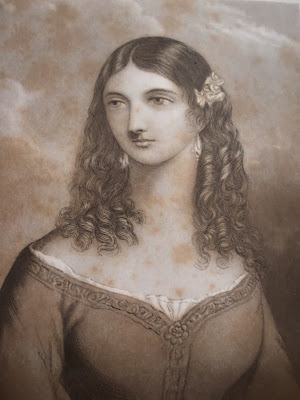My grandmother gave me the book Leila Ada, The Jewish Convert: An Authentic Memoir by Osborn W. Trenery Heighway for my birthday this summer. She found the book, copyrighted in 1853, a few decades ago in my great grandfather's attic. She loaned the book to several people, and at least 2 Jewish friends were converted after reading it.
I was immediately impressed by the beauty of the language employed in writing this book and the skill of the authors. The loveliness of the prose is sufficient to satiate the thirst of any poet--or sesquipedalian such as myself.
Leila lived in a mansion in England with her father, and was raised as a Jewess. Her mother--the love and light of her father's life--had died 2 years after her birth. He lived for Leila, giving her a happy childhood, playing with her, and teaching her how to play the piano. Leila was beautiful and very intelligent, fluently reading and writing several languages. She was also thoughtful and reserved. She started writing a diary at 16, and the contents of the book are mostly taken from her diary.
Leila was very studious, writing "I strive to occupy every moment well; I do this, not simply because it is my interest, but also, and I hope and believe chiefly, because it is my duty." She studied the Old Testament and also many Jewish books such as the Talmud, with which she was not impressed.
When Leila was 18, her father decided to take her on a pilgrimage to the Holy Land. She was very excited about the trip. Before leaving, she decided to study the New Testament. She saw that Christians were a most happy people and wanted to understand why. At the least, she thought, reading the New Testament would enable her to intelligently argue with them concerning religion.
Her journey to the Holy Land took her through Switzerland where she visited with shepherds, enjoyed snowball fights in the Alps, and visited the glacier of Rosenlaui. During this time she wrote in her diary her grief at not knowing the way of salvation. She saw through the scriptures that the Talmud was "altogether a fabrication of man." And cried to God, "Thou knowest--thou art my witness--how much I desire that my heart may be rightly guided, and entirely subdued to thy service...Nothing but the constant presence of Him who fills the earth and heaven, can content my soul."
From Switzerland she and her father traveled to Italy, facing a terrible storm in the mountains. They visited Milan, many beautiful cathedrals, and the amphitheatre in Verona. What seemed most to impress Leila though, was Venice. "It was a lovely moonlight evening as we approached the Adriatic, and such a moonlight--so soft and yet so bright and dear, as I never saw before--a thorough Italian sky and landscape. The sparkling eyes of night twinkled like precious brilliants in the liquid azure. The exquisitely tinted, bluish-roseate mist, hovered over the plains which stretched before and on each side of us; the effect was rendered intensely beautiful--became indeed a feeling--as the silvery light of the moon pierced through it." They stepped into a gondola as they entered the city, and she was delighted by the exquisite loveliness of the sight.
From Venice they continued their journey toward Rome, viewing the Velino waterfalls and the battlefield where Hannibal defeated the Romans. In Rome they saw the ancient ruins and the Coliseum. The climbed to the roof of St. Peter's, where they enjoyed a view of 400 feet; and visited the Vatican Palace and several castles. From there they went to Naples, and finally left the country for Greece.
In Greece they visited Athens, the Parthenon, olive groves, and Mistra in the Isthmus of Corinth, and viewed the place which had once been Sparta. Then they took a ship from Greece to Turkey.
In Constantinople, they stayed a few days. Leila spent hours visiting ancient Turkish cemeteries, and almost got into a lot of trouble when she nearly walked into the mosque of St. Sophia during prayers.
Shortly before reaching Jerusalem, Leila wrote that she no longer could doubt that Jesus was the Messiah. The New and Old Testaments agreed. "I wish to be a Christian, O Lord! Calm my troubled spirit. Do of thy loving kindness guide me to thy simple truth. Let me rest and be at peace beneath the canopy of thy love. Teach me thy law of liberty, as thou in the word has described; and having taught me thy will, assist me to follow thee, to give up my own, whatever shall happen to my body."
In Jerusalem she saw the Mount of Olives, the garden of Gethsemane, the bed of the brook Kedron, the Valley of Jehoshaphat, and Mount Moriah. She became severely ill shortly after reaching the city, however, and her father decided to cut short the trip and take her home as soon as she was well enough to travel. They returned to England after visiting Alexandria, Egypt, taking a steamship to France and quickly reaching home.
Her adventures reminded me of Hannah Hurnard's Hinds Feet in High Places, because of her many contemplations at each location--the storms, the precipices, illnesses, good influences, times of joy, and lessons she learned. It also struck me what a good blogger Leila would have made had she lived 150 years later!
Part 2 of this review (Leila Ada's life as a Christian) will be posted tomorrow!

